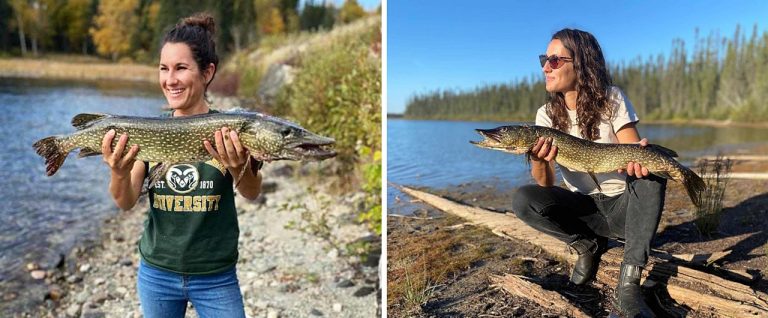Concordia postdoctoral researcher unites the power of Indigenous and Western science

Thaïs Bernos, a postdoctoral researcher in Concordia’s Department of Biology, is breaking new ground in fisheries research working with Indigenous communities.
In cooperation with the Cree Nation of Eeyou Istchee, in Northern Quebec, Bernos seeks to draw on multiple knowledge systems to better understand the relationships between culturally important fish species and the people that depend on them.
“I’m part of the FISHES project, a major collaboration between Indigenous communities and researchers from several universities,” she explains.
“Although I normally work with fish, my role in the FISHES project is more to establish the link between Indigenous and Western science, which means I mainly work with people.”
Bernos works in close collaboration with the Cree community of Mistissini, who lives in, owns, and manages some of the vastest areas of freshwater ecosystems and boreal forests in Quebec.
Together, they co-create research that facilitates the bridging of the deep ecological knowledge that the Cree have developed over millennia of close connections with their land and its inhabitants, and scientific knowledge generated with state-of-the-art genomic approaches.
“We need to unite the power of Indigenous and Western science, and in particular the science of fisheries and genomics, to find better solutions to current issues like climate change,” she says.
United by a shared conviction
The collaborative work has three specific objectives:
- To inform community initiatives to manage and safeguard lake trout diversity and its biocultural heritage for the community’s benefit and for the planet
- Create an operational framework to assess biocultural diversity within harvested species
- Align the policy framework so it honours Indigenous knowledge and improves the stewardship of biocultural diversity
“We’re united by the shared conviction that we need to better protect fish and ensure they continue to provide the benefits — cultural, food, health — that they bring to Indigenous communities,” Bernos says.
“Our goal is to find innovative ways to manage the fisheries in line with Cree values and objectives.”
Lively dialogue and knowledge exchange
“My colleague Pamela, who is Cree and works for the Mistissini Cree Nation, and I organize workshops where we invite elders, experts or community members to discuss.”
The lively dialogues and the knowledge exchange in the workshops form the base for Bernos’s research. Together, the group members try to find ways for communities to reduce the negative impacts of pressures such as climate change on the fish populations — the local communities depending on them for their cultural and dietary well-being.
“They talk about how they see biological diversity through their own eyes and visions of the world; I describe what genomic technologies allow us to see,” Bernos explains.
“They talk about the changes they’ve observed in the state of fish populations and the waters of Lake Mistassini, on whose shores they grew up; they also talk about a fishing culture that is constantly evolving,” she adds.
“They discuss, for example, the species fished, but also the technologies used and the values around it. It’s an incredibly enriching experience.”
Collaboration for growth and progress
Born in West Africa, Bernos spent her formative years in Belgium, France, Montreal, Toronto and Madagascar. Her scientific pursuits eventually led her to return to Quebec to complete her postdoctoral studies.
“Quebec appealed to me because of its unique cultural fabric,” she relates.
Bernos’s commitment to understanding and preserving unique cultural practices has led her to her pivotal position in Quebec’s research landscape.
“I think international students can have such a positive impact on Quebec’s academic and social fabric,” she says.
“Collaboration between cultures is key to finding solutions to the common issues we face. I salute Concordia for fostering an environment where linguistic and cultural diversity are not obstacles but assets for the growth and progress of our society.”
Discover Concordia’s Department of Biology.


